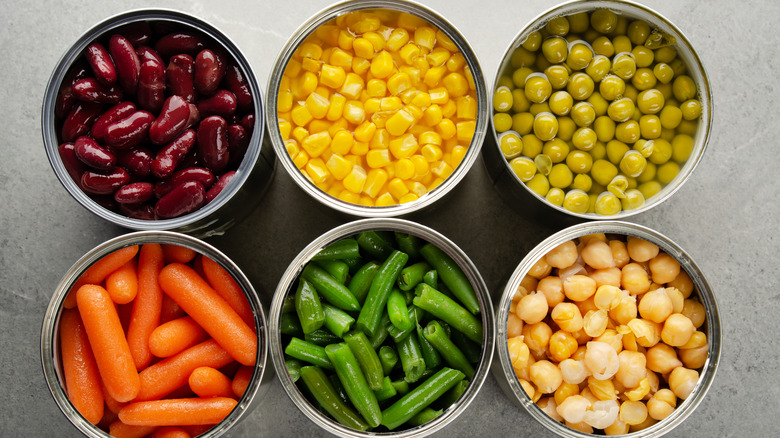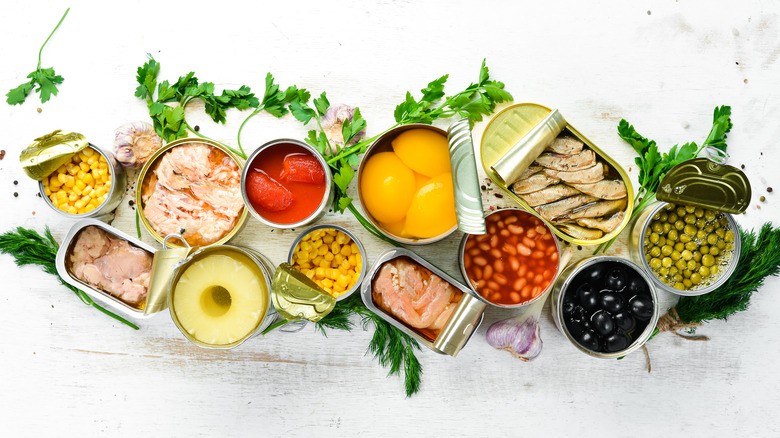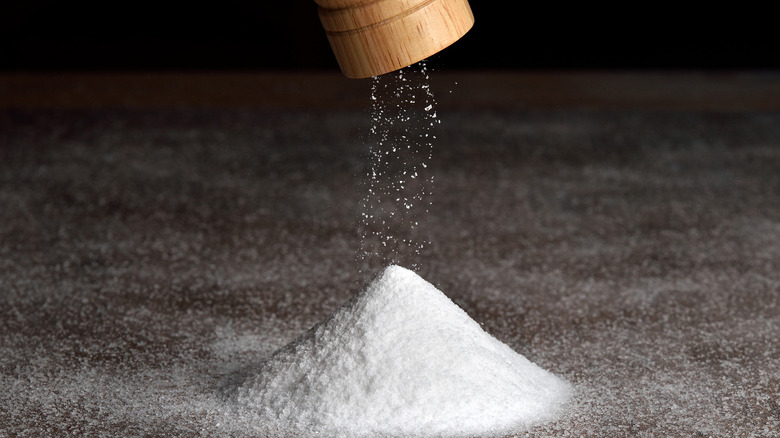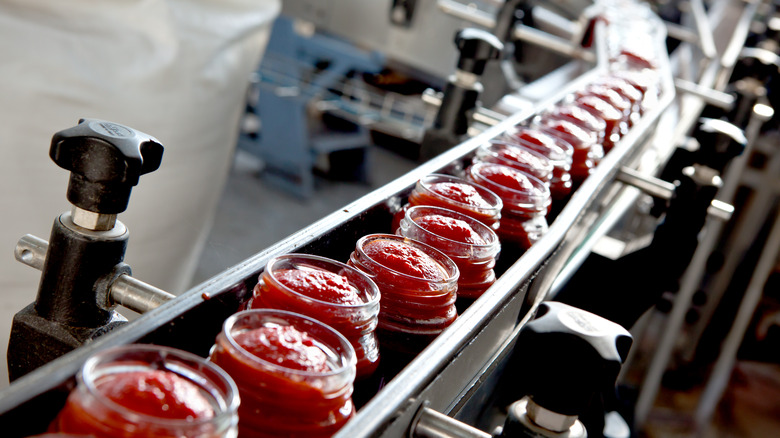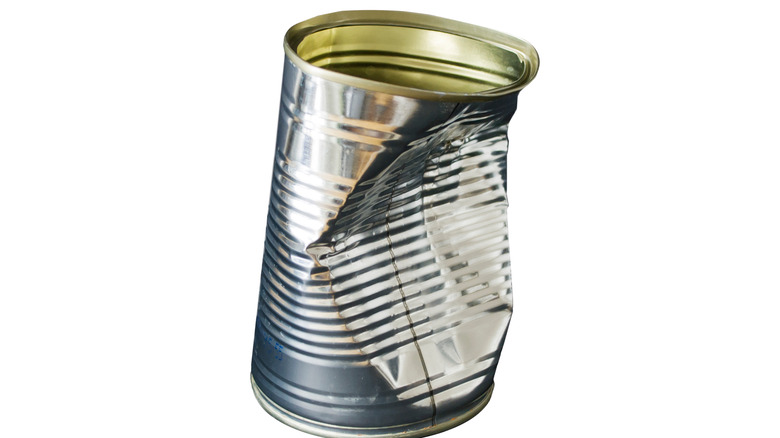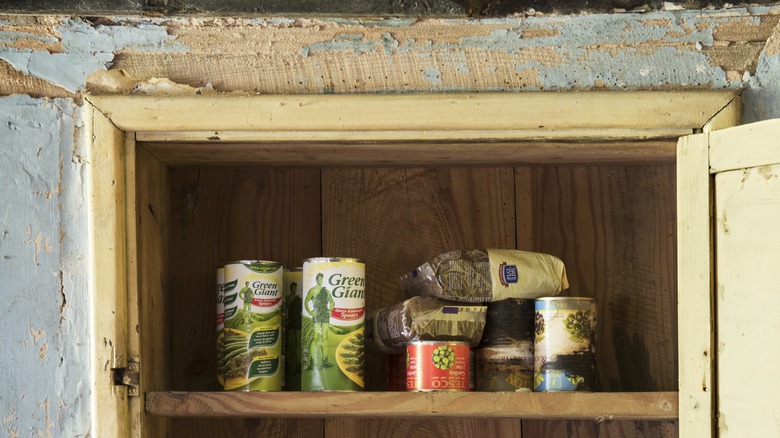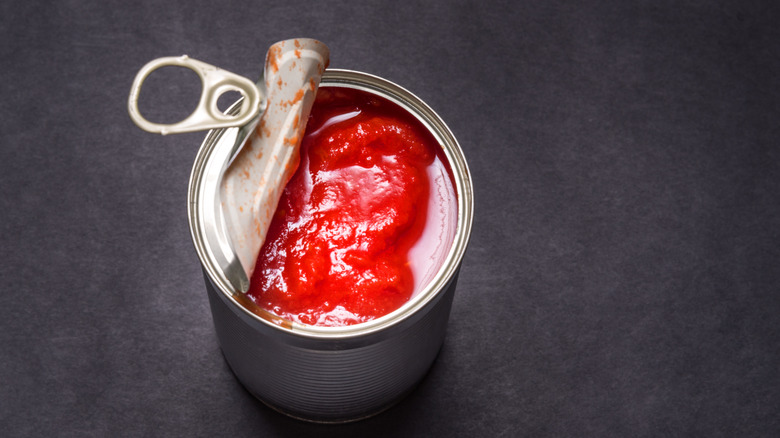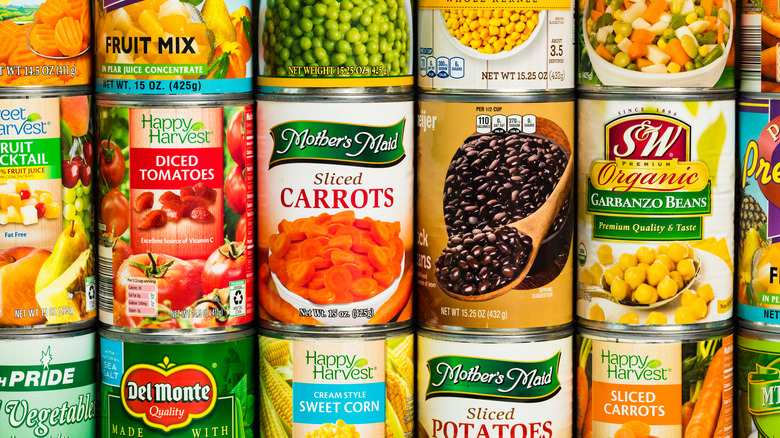8 Canned Food Myths You Probably Fell For
Canned foods are nothing if not convenient, but they're also rife with misconceptions. Who hasn't leaned into the idea that canned foods are less healthy than fresh or bad for the environment or even toxic? It's time to demolish these myths once and for all!
But first, a bit of history. Canning has been around since the early 19th century and was conceived as a way to help soldiers more easily keep and transport their rations. This technique, pioneered by Frenchman Nicolas Appert, was adapted just a few short years later by Englishman Peter Durand who swapped tin-coated cans for the glass bottles Appert had preferred.
Canning works by sealing food in a container using heat, a process that essentially cooks the food, killing off any bacteria. The resulting food can be kept around for months or even years. Per History, the invention of canning "revolutionized" the way we eat, leading to a bustling exported food industry and to increased availability of fruit and vegetables out of their seasons and regions of origin.
Seems pretty cool when you think about it, right? All the more reason to bust the unfortunate myths that so many of us are so willing to believe about canned foods.
Canned foods are not as nutritious as fresh foods
It's easy to assume that what one gains in convenience when canning foods, one loses in nutrition. But this just isn't the case. One study in the American Journal of Lifestyle Medicine found that vegetables were just as nutritious canned as packaged fresh or frozen, and given their lower price point, they were also a better bang for your buck. Registered dietitian Diana Orenstein tells The Kitchn that this is due to the fact that veggies are often canned at the peak of freshness, making them a great choice for maximum nutrition value in most cases. She notes that the heating process used to seal the cans even makes some nutrients more bioavailable; cooking tomatoes, for example, helps release essential, anti-carcinogenic antioxidants, which means canned tomatoes may be an even healthier choice than fresh ones.
Fruit, nevertheless, proved more variable according to the study. That's due to the fact that heat breaks down some water-soluble vitamins, including the vitamin C so prevalent in many fruits, so you may not be getting quite the nutrition punch with canned fruit as with fresh.
Canned foods are high in salt
This myth, like many, has a hint of truth in it; canned foods are indeed often quite high in salt, and the more processed a canned food is — think condensed soup — the more salt it's likely to have. The Kitchn reports that just one cup of canned soup could give you all the salt you're meant to consume in a day.
But while canned foods certainly can contain a lot of salt, that doesn't mean they have to. Salt in canned foods is added as a preservative, but since the canning process itself is a preservative, low-sodium options are not just available — they're prevalent.
Per The Kitchn, registered dietitian Diana Orenstein offers the recommendation of seeking out low- or no-sodium options. Double-check how low the sodium actually goes by looking at the back of the can for the percent daily value of sodium in a serving (and make sure the serving size listed is actually the serving size you plan to consume). The FDA advises that 5% of your daily value is considered low for sodium, so canned foods with 5% DV or lower of sodium are a good choice.
Canned foods are filled with preservatives
Canning is a method of preservation, so canned foods don't have to contain loads of preservatives. That said, some companies double down on extending the shelf life of their canned foods by adding salt, sugar, or chemical preservatives in addition to the natural preservation afforded by the canning process.
While registered dietician Samantha Cassetty, writing for NBC News, advises to skip canned foods with artificial preservatives, she also acknowledges that the use of preservatives in canned foods is rare. "The Complete Course on Canning" bemoans the fact that most consumers don't understand that canning food requires no preservatives, though the reality is that some canned foods do indeed contain sulfites for freshness (not to mention added salt or sugar, which are natural preservatives). It is, however, relatively easy to avoid these just by scanning the ingredients list for terms like potassium sulfate, sulfur dioxide, potassium bisulfite, potassium metabisulfite or sodium sulfite (via FitDay). Another recommendation is to seek out canned products that eschew preservatives altogether.
Canned foods contain toxic BPA
Bisphenol A, aka BPA, is a chemical substance used in some plastics and in can linings. In the case of the latter, the point of BPA is to keep the food and metal from coming into direct contact with one another. In essence, BPA creates a seal separating the two (via Insider).
While the FDA asserts that BPA is safe, waves of consumer concern followed research that seemed to indicate that BPA may be an endocrine disruptor and that it could possibly leach into food from the can lining. This led to a widespread abandonment of the technique. According to a 2020 report from the Can Manufacturers Institute, over 95% percent of food can production in the United States had phased out the use of BPA.
If you want to avoid BPA, the good news is that it's fairly simple, as many brands are fairly vocal about not using the chemical. However, according to Leonardo Trasande, an expert in children's environmental health and professor at NYU, the replacement material — BPS — is a "cousin chemical" of BPA and may have the same health concerns linked to it as the former (via The Guardian). So if you're fearful of BPA as well as BPS, it's perhaps best to opt for foods canned in stainless steel containers or glass jars.
Dented cans should always be avoided
Don't go tossing out any can with a dent in it, but do proceed with caution. According to Suki Hertz, an associate professor of nutrition and food safety for the Culinary Institute of America, the dent's severity and location are key clues in deducing whether it's a health hazard or simply an aesthetic imperfection.
Hertz tells Yahoo! that minor dents are no cause for alarm, but when they're bigger, or found on the seam of the metal, it's best to steer clear, as these could indicate that the seal of the can has been jeopardized, paving the way for bacteria to get inside and negate the preservative purpose of the can itself. The USDA defines a deep dent as one that fits your finger and notes that eating from such a severely dented can may lead to botulism, a dangerous and potentially lethal form of food poisoning.
Canned foods shouldn't be eaten after their 'use by' date
Canned foods often have a very long shelf life, which means that many of us manage to consume them well before the date printed on the top. But if you ever find yourself pulling a can out from the back of the cupboard, and you notice the "sell by" or expiration date has passed, don't chuck it out — at least not immediately.
According to the USDA, as long as the can has not rusted or swollen, the food inside is likely safe, even past the "sell by" date. Indeed, the agency notes that canned foods are pretty much good "indefinitely" barring these indicators that the preservation seal on a canned food has somehow been compromised.
Keeping from tossing canned foods that are still edible is an excellent way to do your part in combatting pervasive food waste. According to the FDA, it is estimated that 30-40% of all food produced in America is wasted, so it's up to all of us to do our part.
Refrigerating opened canned foods leads to food poisoning
Many of us have opened a can of tomatoes or coconut milk and, finding we don't need the whole thing, stuck the can (and the remainder of its contents) into the fridge. Make no mistake: There is a possibility, however slight, that saving canned foods in the fridge can contribute to dangerous health effects including lethal forms of food poisoning like botulism. But according to most experts, it's so rare as to be basically a non-issue (via SBS). In fact, the USDA's official stance is that keeping opened cans in the fridge does not pose a health risk, so long as the food is consumed within its general perishability window.
The main issue with refrigerating canned foods still in their can isn't health-related but rather taste-related. According to Lifehacker, keeping foods in their cans after opening can contribute to an "off" taste, particularly when it comes to more acidic foods like tomatoes and tomato sauce. There are some canned foods that fare better in their open cans than others, according to Lydia Buchtmann, spokesperson for the Australian Food Safety Information Council (via SBS). These include sugary or fatty foods, like peanut butter. When in doubt, if you don't want your canned food to taste metallic, it's best to transfer it to another container. But if you're just too lazy (or are out of clean Tupperware), don't sweat it.
Canned beans are less sustainable than dried
If you've ever felt guilty about stocking your cupboards with canned beans instead of dried, stop it right now. According to Sustained Kitchen, the truth is that while canned beans are indeed heavier to transport and boast more packaging than dried, the industrial process of cooking and canning beans uses less energy than cooking dried beans at home. The electricity or gas you have to use to keep your pot at a slow simmer while your beans cook is far greater, all things considered, than simply cooking and canning vast quantities of beans.
All things considered, canned beans are often more sustainable and eco-friendly than dried. There's no need to feel guilty about leaning into the convenience of this heart-healthy, shelf-stable protein, and using it in everything from three-bean chili to cannellini bean salad ... just as long as you recycle the can!
